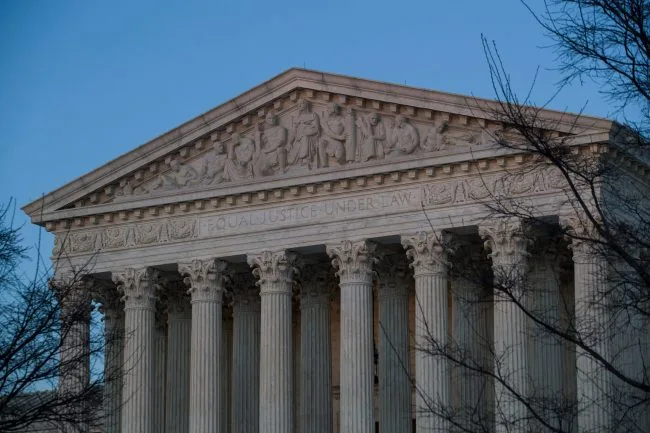Mueller’s verbal summary of his own report demonstrates the need for more investigation, if not impeachment.
 Robert Mueller, in the process of announcing his retirement from the Department of Justice today, also gave a brief summary of what his team’s report said:
Robert Mueller, in the process of announcing his retirement from the Department of Justice today, also gave a brief summary of what his team’s report said:
- Russia interfered with our elections.
- The investigation did not identify active collaboration between Trump’s campaign and Russian efforts at interference.
- Though that might be in part because of attempts to obstruct the investigation.
- The President did a bunch of obstructive things but, because of DoJ rules, Mueller could not actually file any charges.[1]
- “If we had confidence that the president clearly did not commit a crime, we would have said that.”
Which has magically transformed into the President, and his collaborators in the Senate GOP Majority, into “Innocent! Exonerated! No collaboration! No obstruction! CASE CLOSED!”
No, literally. That was the phrase that both the President tweeted …
… and his inexplicable Newest Closest Bestest Senator Friend, Lindsey Graham declared
Today’s statement by Mr. Mueller reinforces the findings of his report. And as for me, the case is over. Mr. Mueller has decided to move on and let the report speak for itself. Congress should follow his lead.
Graham’s statement makes little sense. Mueller’s report — and his statements about it — make it clear that Congress should do anything else but move on. If the Justice Department is prevented by internal regulation from indicting the President, it is clear from Mueller’s words in both media that he is passing on to Congress to determine if their Article II, Section 4 powers need to come into play.
Of course, it’s also worth noting that Trump’s message has, at least in this instance, changed a little bit. He used to be all “NO OBSTRUCTION! NO COLLUSION!” in his cloudcuckoo-land summary of the Mueller Report. Now he’s sounding like a cheap lawyer. “Insufficient evidence!” “Therefore, in our Country, a person is innocent!”
Of course, Trump’s avid watching of Perry Mason should have told him that’s all factors in an actual trial. It doesn’t really apply to an investigation, especially one where the person in question cannot be actually tried (according to those DoJ rules).
Still, the tweet is oddly defensive. It doesn’t assert complete exoneration, just … “Well, they couldn’t make a strong enough case.”
Sounds like a challenge.
Graham, wanting to hustle on but at least acknowledge he read and wants to address part of the Mueller Report, added:
It is now time to move on and to work together in a bipartisan fashion to harden our election infrastructure against future attempts by Russia and other bad actors.
Which would be a fine sentiment … if his Senate GOP colleagues weren’t standing in the way of that, too. Well, one of them, at least, but he’s the only one who really counts.
The reason, said Sen. Roy Blunt (R-Mo.) on Wednesday, is that Senate Majority Leader Mitch McConnell (R-Ky.) has decided not to bring any election security bills to the floor for a vote. Blunt’s remark occurred during a hearing of the Rules and Administration Committee, which has oversight of election administration. When Sen. Richard Durbin (D-Ill.) asked Blunt, the chairman, whether he was planning mark-ups of any of the several election security bills pending before the committee, Blunt responded that it would be fruitless to advance legislation that McConnell would not allow to come up for a vote.
“I don’t see any likelihood that those bills would get to the floor if we marked them up,” Blunt said. After prodding from Durbin, Blunt explained, “I think the majority leader just is of the view that this debate reaches no conclusion.”
Well, if Mitch says there’s no value in Congressional action on election security … I guess … we can all sleep well? One assumes Mitch is following through on Donald’s cue: the President really dislikes discussion of Russian interference in the election (it’s the one part of the report he never discusses, let alone creatively reinterprets), probably because he feels it makes his Biggest Victory Ever seem somewhat sketchy.
Indeed, it’s worth noting that, even if the Mueller Report didn’t find any active collaboration / conspiracy between the Trump campaign and Russian interference, it did note that the campaign and the President welcomed and took advantage of that interference — and Trump’s mantra since it was first discussed — has been denial about it. It didn’t happen. If it happened, it might not have been the Russians. Maybe the Chinese. Maybe some fat guy in a basement. But not the Russians. Vladimir told me. Yeah, the intelligence guys say otherwise, but what do they know?
As a result of Trump’s vociferous denials that interference occurred, or, if it did, that it came from Russia, next year’s elections remain vulnerable to interference. That represents, at the very least, a serious lapse in duty — and, to the extent that one can presume Russia’s interference will again be in favor of Trump, it represents yet another case of Trump welcoming, if not actively conspiring, with foreign interests.
So, then, what to do?
There’s a growing belief amongst the Democrats that the magnitude of the charges against Trump — in the remit of Mueller’s investigation, in his less covert activities, and in other areas hinted at but not investigated by Mueller (such as Trump’s financial shenanigans) warrant, if not current articles of impeachment, then impeachment-directed investigation. Indeed, given the argument by Trump’s personal attorneys that various straightforward and legal inquiries and subpoenas from various House oversight committees have been met with challenges as to whether they are based on legitimate legislative purposes or simply rank “Presidential Harassment!” (as the snowflake president occasionally tweets).
Investigation as part of an impeachment inquiry is constitutionally protected behavior for Congress, backed by substantial case law (and the GOP’s own behavior toward far less grotesque behavior by Bill Clinton).
Against that growing tide for impeachment or impeachment-directed investigation are two arguments.
The first is that the GOP in the Senate — holding the majority in a chamber that would need to vote 2/3 in favor of conviction in an impeachment trial — has gone on record that it will simply quash any such quixotic effort by the House.
“I think it would be disposed of very quickly,” said Senate Judiciary Committee Chairman Lindsey Graham (R-S.C.). “If it’s based on the Mueller report, or anything like that, it would be quickly disposed of,” he added.
Sen. John Cornyn (R-Texas), an adviser to McConnell’s leadership team, said “nothing” would come of impeachment articles passed by the House.
Second, there are concerns that moving for impeachment against Trump will rile up the GOP base, come across as a purely political attack that will rally support for Trump and the GOP, and win him re-election in 2020 … especially if the Senate “acquits” him.
I don’t buy either of those arguments.
- While arguably impeachment proceedings will further enliven Trump’s true fans, they might have a similar effect upon those who oppose him, especially if impeachment-related hearings drag out further Trump crimes.
- Lack of action — letting Trump get away with it, especially out of fear, is bound to dampen enthusiasm on the Democratic side, and make the whole thing seem more political. It also gives him the argument of, “Well, if I did something wrong, why didn’t they do anything about it?>
- While there are arguments that it will help the GOP, there are counter-arguments that it will help the Democrats. So … since it comes down to conclusions drawn by the same folk who declared that Trump could never win in 2016 … maybe dropping all the meta-pragmatic analysis is a better approach.
- In which case, what is the right thing to do? When faced with crimes against the nation, corruption and complicity in attempts to subvert our democracy … then at a minimum, investigating to establish further evidence is a moral (and pragmatic) imperative.
- And if it rises to the (subjective standard) of “high crimes and misdemeanors” … then act on it, and shame the devil.
- And if the Senate GOP majority ignores compelling evidence — indeed, fails to even consider such evidence in their haste to quash any embarrassment to Their Man in the White house … then fine. Don’t let those poor citizens dictate the course of action. The voters will judge, or history will. (Might I recommend JFK’s (ghost written) Profiles in Courage as useful reading material in this context?)
- Just as with Mueller, faced with (among other parts of his remit) dealing with potential crimes by a man he believed he could not indict, found value in identifying the crimes involved, so, too, the House should consider the value of identifying and revealing the crimes they believe are there, whether to educate the voters of November 2020, or for posterity.
Do you want to know more?
——
[1] Ironically, those same rules theoretically should have kept Attorney General Barr from weighing in on the issue. Go figure.






























